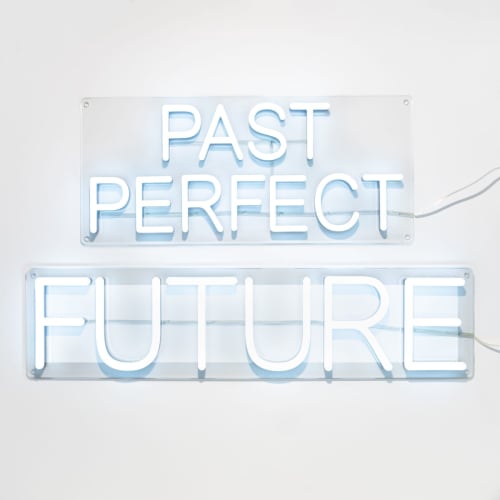ERIN MICKELSON: PAST PRESENT FUTURE
October 29, 2021–January 15, 2022
OPENING RECEPTION
Friday, October 29, 5–7pm
CLOSING RECEPTION
Friday, January 14, 2022, 5–7pm
(October 2021) “I was always hoping for something gorgeous, or hopeful. But it was terrifying, and ultimately ominous,” says Santa Fe-based artist Erin Mickelson. The artist, interested in the labyrinthine meanings and Derridaean readings of language and symbols, embarked in early 2020 on a research-intensive journey into artificial intelligence, data-mining and how the artist’s hand—and the viewer’s participation—might battle the Western biases of our online world. The artist’s inaugural exhibition, titled PAST PERFECT FUTURE and spanning the gallery atrium and catwalk, features three conceptual installations, one of which is suspended from the atrium skylights; 30 unique artist books; two computer-generated musical recordings on vinyl in a handcrafted sleeve; and twelve letterpress works on paper, among other sculptural and participatory objects. An Opening Reception will be held on Friday, October 29, 5–7pm with an experimental solo performance by Clara Byom of New Mexico Contemporary Ensemble. A Closing Reception featuring randomly selected volunteer audience participation will be held on Friday, January 14, 2022 from 5–7pm.
“At first this show was about perception and the dissonance experienced when our expectations are not met. That was the foundation,” says Erin Mickelson. But as the unprecedented events of 2020 unfolded, the artist began to investigate online prediction algorithms, machine learning, language processing and the underlying biases of these systems. “I worked at the beta level with Generative Pre-trained Transformer 3 (GPT-3), the largest language model to date using machine learning. It’s very revealing how enmeshed the biases of the Western world are within its computations, which is dangerous.”
Mickelson started soliciting “forecasts” about the future of Earth from this language model, and watched with fascination (and some trepidation) as it spit out answers that were in turns silly and ominous, nonsensical and eerily cogent. In the exhibition, a year’s harvest of these algorithmic fortunes populate a wall installation titled Future Histories Library. The piece resembles a library card catalog, but Mickelson places mirrors where the author’s name would normally appear. In the world of data-mining, Mickelson reminds us that all citizens of the Internet contribute to such algorithms, and that we therefore have the power to shape futures. “Mickelson casts us into the chaotic world of the algorithm through elegant objects made using analog techniques,” says Gallery Director Jordan Eddy. “An ever-shifting, virtual universe is distilled into something recognizable, which can be both comforting and scary. It’s somehow, through her intervention, human.”
Mickelson also presents four “ghost” composition recordings, generated by A.I. based on a short sample of Bach’s concertos. While the prompt is recognizable, the platform’s output is a new recording, composed by no one—or, in a sense, by every musician whose work influenced the algorithm. Through this and several other participatory sculptures and installations, Mickelson explores questions of authenticity and credibility in the uncanny valleys on the digital world. “Pressing it on vinyl lends it authority, and this mirrors books. You believe what is in a codex, and even though this is music never performed, by instruments never played, it’s been preserved on vinyl, and made real. The results can be so convincing that only a subtle sense of uncanniness, confusion, or dissonance indicates the creator was not human. A future we imagined may be upon us. But is it the future we want?”
Erin Mickelson’s work includes printmaking, bookbinding, new and mixed media, artist books, and micro-press publishing. Mickelson’s imprint is Broken Cloud Press. She earned her BFA with a concentration in book arts at Oregon College of Art & Craft, and holds a degree in graphic design as well. Erin includes both traditional techniques as well as digital and experimental processes in her work, which is held in various private and public collections including the libraries of Seattle Art Museum, Yale University, Reed College, Baylor University, and Minneapolis College of Art & Design.
###
For press or image inquiries, please contact Marissa Fassano at marissa@formandconcept.center or call (505) 780-8312 x1002.

